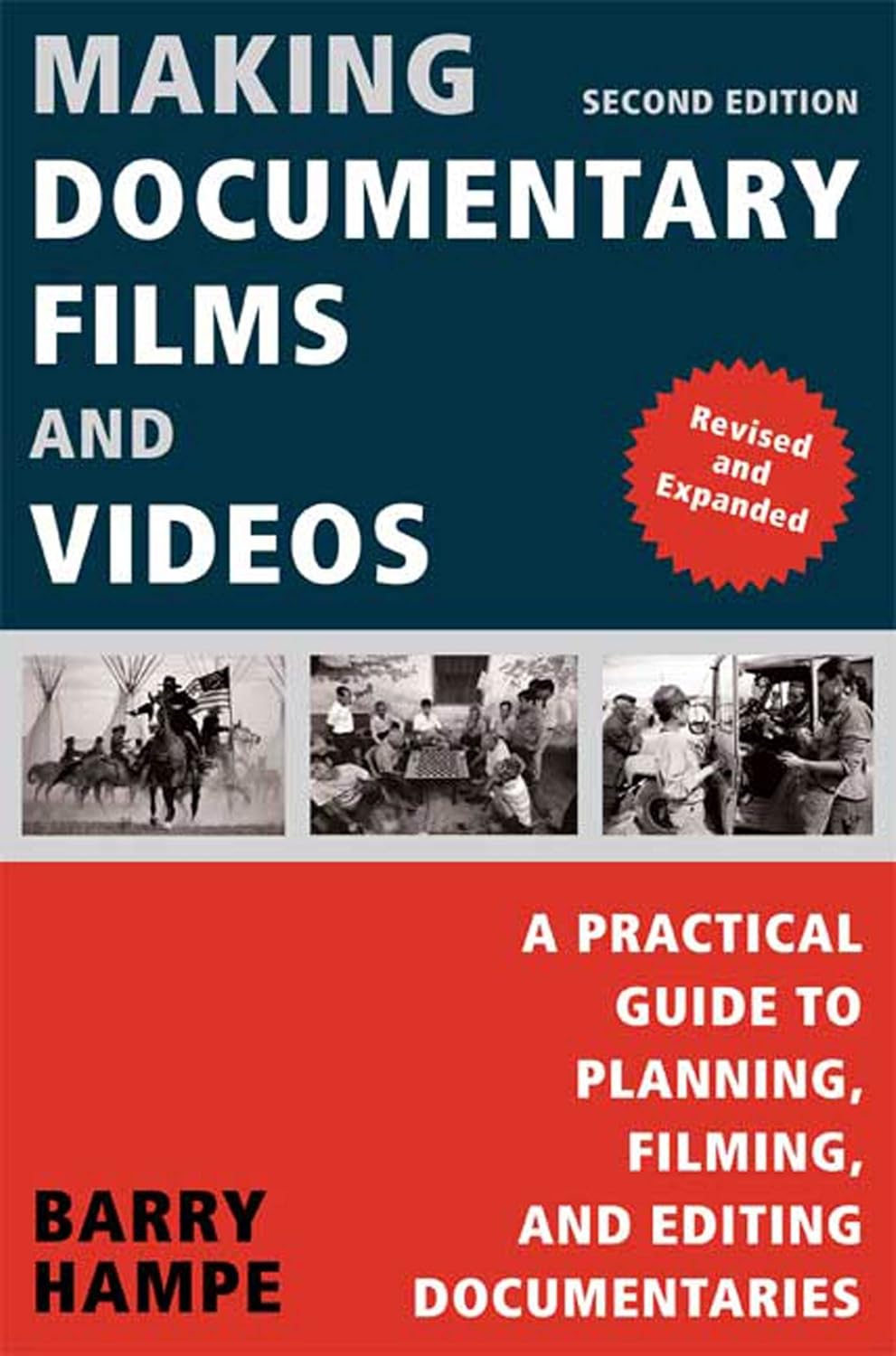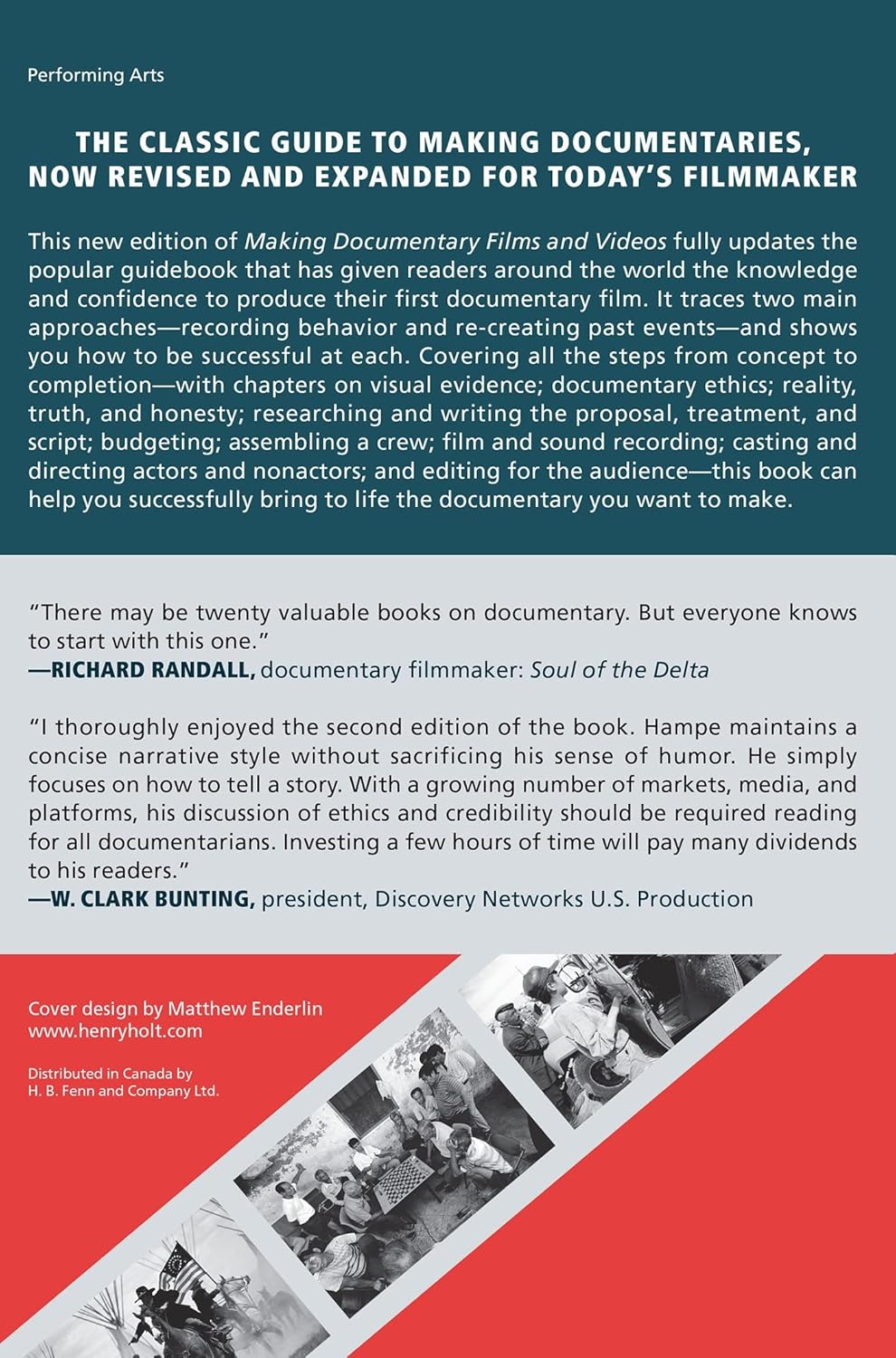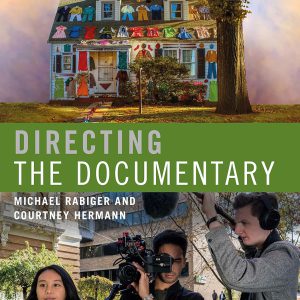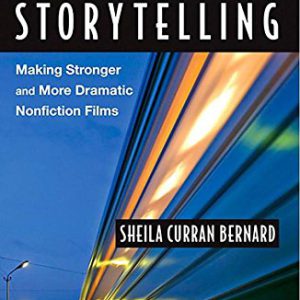Directing the Documentary is the definitive book on the documentary form, that will allow you to master the craft of documentary filmmaking. Focusing on the hands-on work needed to make your concept a reality, it covers the documentary filmmaking process from top to bottom, providing in-depth lessons on every aspect of preproduction, production, and postproduction.
The book includes dozens of projects, practical exercises, and thought-provoking questions, and offers best practices for researching and honing your documentary idea, developing a crew, guiding your team, and much more. This fully revised and updated 7th edition also includes brand new content on the rise of the documentary series, the impact of video on-demand and content aggregators, updated information on prosumer and professional video (including 4K+), coverage of new audio & lighting solutions and trends in post-production, coverage of the immersive documentary, and provides practical sets of solutions for low, medium, and high budget documentary film productions throughout. The companion website has also been fully updated to a variety of new projects and forms.
By combining expert advice on the storytelling process, the technical aspects of filmmaking and commentary on the philosophical underpinnings of the art, this book provides the practical and holistic understanding you need to become a highly regarded, original, and ethical contributor to the genre. Ideal for both aspiring and established documentary filmmakers, this book has it all.













DP Sailor –
Several reviews on Amazon criticize this author for supposedly injecting his personal political views into the book, but I don’t see it that way. Hampe is clearly on a crusade, but it’s a crusade against what has come to be called ‘attack video’. And perhaps it’s not so much a crusade, as it is an appeal for a return to long-lost objectevity.It’s fashionable to say, these days, that objectivity doesn’t exist, and that we are all captive to our points of view. Perhaps we are, but the best documentaries transcend point of view. I have seen great documentaries on controversial subjects where I couldn’t tell the documentarian’s position on the subject matter. I have seen people leave these screenings arguing both sides of the issue, and both citing evidence from the film.I have seen other great documentaries where the filmmaker presents both sides of a case and states a personal conclusion. In some cases, I agree with the documentarian, and in others I do not. But in every case, I believe a fair shake was given to both sides.I think that’s what Hampe tries to teach in this book. And in an era where the documentary form has degenerated into the sort of partisan bickering that has swamped political dialog, he makes a very worthy effort. Let’s face it; anybody can shoot an attack piece without a whole lot of effort. How tough is it, really, to stage an ambush interview? It is far more difficult to construct an intelligent documentary with enough visual punch and dramatic structure to engage the viewer and keep them engaged up to the closing credits.The book does a good job teaching the novice filmmaker how to do that. It’s not very different from prepping a work of fiction, but it is hard work–particularly if one aspires to rise above the level of boredom. Hampe does a very good job of laying out a process for doing so, and I have found the book to be highly illuminating. I can recommend it without reservation.
Robert Nikolas –
This is a refreshingly useful book that gets down to what really makes a great documentary. I was pleasantly surprised by the authors honesty and emphasis on truth. It really does not matter if you agree or disagree with the authors Libertarian views because you can not argue with his emphasis on truth in film making.The book is geared towards people that have at least some production experience because it does not focus on gear, lighting or sound (rightfully so as those change very quickly in this industry). Rather this book spends a lot of time teaching you the discipline and people skills that are required in order to capture and edit great footage in most efficient and effective ways. It provides guides into planning, script writing, interview techniques, scheduling, research, and other aspects of documentary making that are frequently overlooked or ill prepared for.I found the authors decades of experience and knowledge tremendously educational. His book has helped me save lots of time and brought my skills into a whole new level. It has also challenged me to recognize and balance my prejudices in this very polarized political landscape.Great job Berry and Thank You…
Eduard Gfeller –
I rarely read a book from cover to cover (including appendices), except for Barry Hampe’s Making Documentary Films and Videos. I like the comprehensive coverage of the subject and the many practical examples. Expressing issues visually (rather than talking at the audience by voice-over or interviews) and the emphasis on verisimilitude are particularly helpful points. The book is well organized, well indexed and contains ample useful references. Emphasis on issues such as truth, what is evidence, and examining one’s motives is particularly appreciated. The book is very well written, and I will likely re-read it and use it as a reference in the future.
Matt Jarvis –
I was hired last minute to take over the Digital Cinema Program and the previous professor had Hampe’s earlier (they had already set up the e-bookstore with the books for the courses being what the previous professor used) and I figured the book assigned was this one. It wasn’t, this is a newer version with some newer chapters and appendices (165 pages more in the newer book and it covers the switch over to digital video technology).I purchased one and put it in the library for the course’s students to be able to read. Not only does it address digital video and editing, but it also goes into more discussion on the ethics of documentary filmmaking. This is an important subject to teach to students when you come from my journalistic background. I definitely recommend this over other books you can find on the subject, especially over Hampe’s previous book on the subject. He obviously felt it needed to be improved upon and he did.
Arvind Parulekar –
Detailed journey from concept to completion with plenty examples
Fully enlightening on Documentary films. I had wrong notion about documentary being dull n boaring. The book – Barry Hampe – has put it in so nuch detail that page after page my interest rose n also found the charm in film making on facts.A very in depth knowledge imparted in the book with actual examples of script, proposal, screenplay that thrown full light on the subject.Highly reccommended to all those who wish to enter film making.
Amazon Customer –
Brilliant read
Great book
AV –
good and informative
very interesting to read. it really explains how a documentary should be done. everyone who wants to make one, should read it. also if you are just interested in the topic.
azzay –
Four Stars
I like the book very information gaining
C Bennett –
brilliant book and fast delivery
For my son, brilliant book and fast delivery